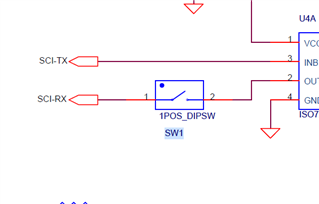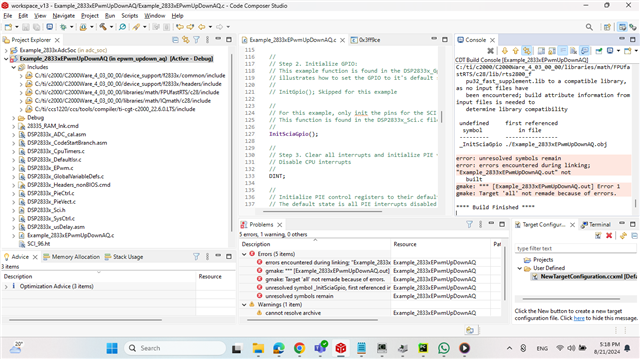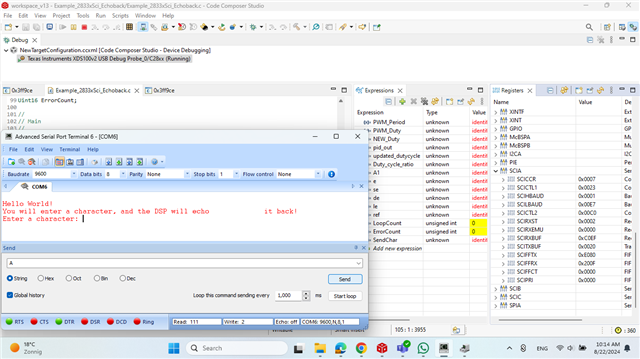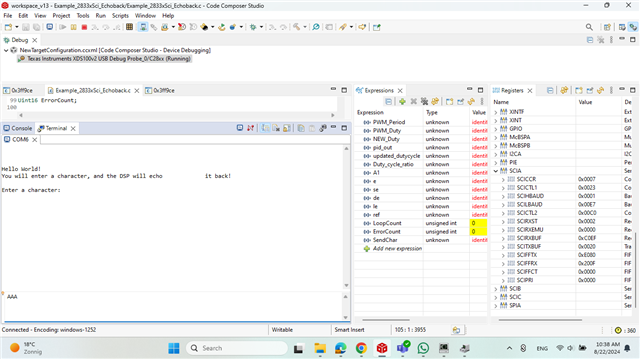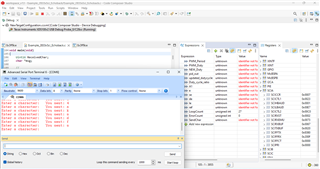Other Parts Discussed in Thread: C2000WARE
Tool/software:
Dear TI members,
I am testing example 9_4 from the TI F28335 manual, I am unable to receive the data string ("Instruments") by inserting the text "Texas" on the terminal. The example Module 9 with its sample code is given as below:
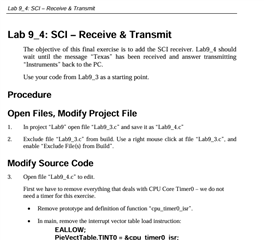
Code:
//
// Lab9_4: TMS320F28335
// (c) Frank Bormann
//
//###########################################################################
//
// FILE: Lab9_4.c
//
// TITLE: DSP28 SCI - Communication to PC - Terminal
// SCI-Setup: 9600 Baud, 8 Bit , ODD Parity , 1 Stopbit
// SCI - TX and RX - Interrupt are used in this Lab
// SCI - TX and RX - FIFO are used in this Lab
// DSP waits for "Texas" and answers with "Instruments"
// Watchdog active , serviced solely in main-loop
//###########################################################################
// Ver | dd mmm yyyy | Who | Description of changes
// =====|=============|======|===============================================
// 3.0 | 08 Jul 2009 | F.B. | adapted for ControlCard28335 @ 20MHz
// 3.1 | 15 Nov 2009 | F.B | Lab9_4 for F28335 @30MHz and PE revision 5
//###########################################################################
#include "DSP2833x_Device.h"
#include <string.h>
// External Function prototypes
extern void InitSysCtrl(void);
extern void InitPieCtrl(void);
extern void InitPieVectTable(void);
// Prototype statements for functions found within this file.
void Gpio_select(void);
void SCIA_init(void);
interrupt void SCIA_TX_isr(void); // SCI-A Transmit Interrupt Service
interrupt void SCIA_RX_isr(void); // SCI-A Receive Interrupt Service
// Global Variables
char message[]={" Instruments! \n\r"};
//###########################################################################
// main code
//###########################################################################
void main(void)
{
InitSysCtrl(); // Basic Core Initialization
// SYSCLK=150MHz, HISPCLK=75MHz, LSPCLK=37.5MHz
EALLOW;
SysCtrlRegs.WDCR= 0x00AF; // Re-enable the watchdog
EDIS; // 0x00E8 to disable the Watchdog , Prescaler = 1
// 0x00AF to NOT disable the Watchdog, Prescaler = 64
Gpio_select(); // GPIO9, GPIO11, GPIO34 and GPIO49 as output
// to 4 LEDs at Peripheral Explorer
InitPieCtrl(); // default status of PIE; in DSP2833x_PieCtrl.c
InitPieVectTable(); // init PIE vector table; in DSP2833x_PieVect.c
// re-map PIE - entry for SCI-A-TX and SCI-A-RX
EALLOW;
PieVectTable.SCITXINTA = &SCIA_TX_isr;
PieVectTable.SCIRXINTA = &SCIA_RX_isr;
EDIS;
SCIA_init(); // Initalize SCI
// Enable SCI-A TX Interrupt Group9 interupt 2
PieCtrlRegs.PIEIER9.bit.INTx2 = 1;
// Enable SCI-A RX Interrupt Group9 interupt 1
PieCtrlRegs.PIEIER9.bit.INTx1 = 1;
// Enable INT9 for SCIA-TX and SCIA-RX:
IER = 0x100;
// Enable global Interrupts and higher priority real-time debug events:
EINT; // Enable Global interrupt INTM
ERTM; // Enable Global realtime interrupt DBGM
while(1)
{
EALLOW;
SysCtrlRegs.WDKEY = 0x55; // Service watchdog #1
SysCtrlRegs.WDKEY = 0xAA; // Service watchdog #2
EDIS;
}
}
void Gpio_select(void)
{
EALLOW;
GpioCtrlRegs.GPAMUX1.all = 0; // GPIO15 ... GPIO0 = General Puropse I/O
GpioCtrlRegs.GPAMUX2.all = 0; // GPIO31 ... GPIO16 = General Purpose I/O
GpioCtrlRegs.GPAMUX2.bit.GPIO28 = 1; // SCIRXDA
GpioCtrlRegs.GPAMUX2.bit.GPIO29 = 1; // SCITXDA
GpioCtrlRegs.GPBMUX1.all = 0; // GPIO47 ... GPIO32 = General Purpose I/O
GpioCtrlRegs.GPBMUX2.all = 0; // GPIO63 ... GPIO48 = General Purpose I/O
GpioCtrlRegs.GPCMUX1.all = 0; // GPIO79 ... GPIO64 = General Purpose I/O
GpioCtrlRegs.GPCMUX2.all = 0; // GPIO87 ... GPIO80 = General Purpose I/O
GpioCtrlRegs.GPADIR.all = 0;
GpioCtrlRegs.GPADIR.bit.GPIO9 = 1; // peripheral explorer: LED LD1 at GPIO9
GpioCtrlRegs.GPADIR.bit.GPIO11 = 1; // peripheral explorer: LED LD2 at GPIO11
GpioCtrlRegs.GPBDIR.all = 0; // GPIO63-32 as inputs
GpioCtrlRegs.GPBDIR.bit.GPIO34 = 1; // peripheral explorer: LED LD3 at GPIO34
GpioCtrlRegs.GPBDIR.bit.GPIO49 = 1; // peripheral explorer: LED LD4 at GPIO49
GpioCtrlRegs.GPCDIR.all = 0; // GPIO87-64 as inputs
EDIS;
}
void SCIA_init()
{
SciaRegs.SCICCR.all =0x0027; // 1 stop bit, No loopback
// ODD parity,8 char bits,
// async mode, idle-line protocol
SciaRegs.SCICTL1.all =0x0003; // enable TX, RX, internal SCICLK,
// Disable RX ERR, SLEEP, TXWAKE
// SYSCLOCKOUT = 150MHz; LSPCLK = 1/4 = 37.5 MHz
// BRR = (LSPCLK / (9600 x 8)) -1
// BRR = 487 gives 9605 Baud
SciaRegs.SCIHBAUD = 487 >> 8; // Highbyte
SciaRegs.SCILBAUD = 487 & 0x00FF; // Lowbyte
SciaRegs.SCICTL2.bit.TXINTENA = 1; // enable SCI-A Tx-ISR
SciaRegs.SCICTL2.bit.RXBKINTENA = 1; // enable SCI_A Rx-ISR
SciaRegs.SCIFFTX.all = 0xC060; // bit 15 = 1 : relinquish from Reset
// bit 14 = 1 : Enable FIFO
// bit 6 = 1 : CLR TXFFINT-Flag
// bit 5 = 1 : enable TX FIFO match
// bit 4-0 : TX-ISR, if TX FIFO is 0(empty)
SciaRegs.SCIFFCT.all = 0x0000; // Set FIFO transfer delay to 0
SciaRegs.SCIFFRX.all = 0xE065; // Rx interrupt level = 5
SciaRegs.SCICTL1.all = 0x0023; // Relinquish SCI from Reset
}
// SCI-A Transmit Interrupt Service
interrupt void SCIA_TX_isr(void)
{
unsigned int i;
// copy 16 character into SCI-A TX buffer
for(i=0;i<16;i++) SciaRegs.SCITXBUF= message[i];
// Acknowledge this interrupt to receive more interrupts from group 9
PieCtrlRegs.PIEACK.all = PIEACK_GROUP9;
}
// SCI-A Receive Interrupt Service
interrupt void SCIA_RX_isr(void)
{
int i;
char buffer[16];
for (i=0;i<16;i++) buffer[i]= SciaRegs.SCIRXBUF.bit.RXDT;
if (strncmp(buffer, "Texas", 5) == 0)
{
SciaRegs.SCIFFTX.bit.TXFIFOXRESET =1; // enable TXFIFO
SciaRegs.SCIFFTX.bit.TXFFINTCLR = 1 ; // force TX-ISR
}
SciaRegs.SCIFFRX.bit.RXFIFORESET = 0; // reset RX-FIFO pointer
SciaRegs.SCIFFRX.bit.RXFIFORESET = 1; // enable RX-operation
SciaRegs.SCIFFRX.bit.RXFFINTCLR = 1; // clear RX-FIFO INT Flag
PieCtrlRegs.PIEACK.all = PIEACK_GROUP9;
}
//===========================================================================
// End of SourceCode.
//===========================================================================
The Result window is shown below: By typing " Texas" and then pressing enter, I don't receive "Instruments" at the Terminal.... which is a problem:
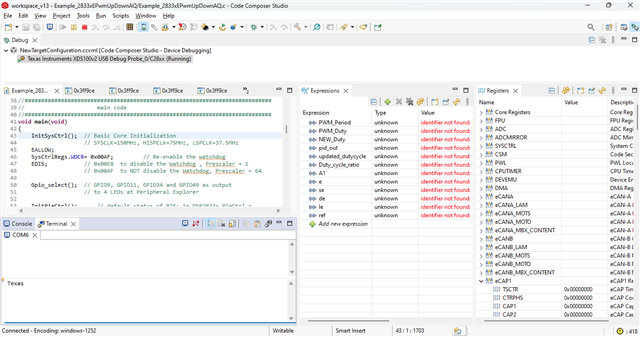
Please suggest accordingly.
Thanks
Regards
Arsalan


